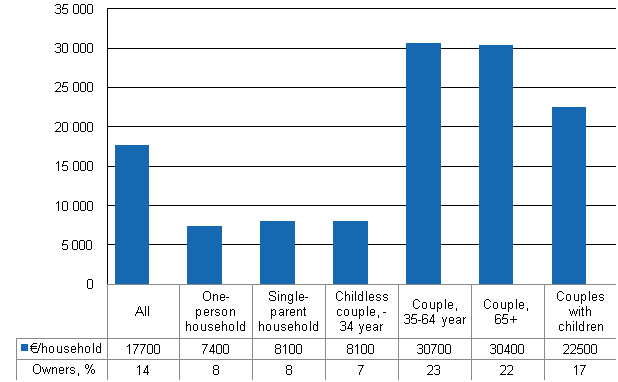2. Wealth increases and diversifies with age
Accumulating wealth usually takes time, and the peak of wealth is usually reached rather late during a person’s life span. Young age groups have little wealth, whereas people are more likely to own dwellings, free-time residences and liquid assets before retirement age. In 2009, households of those aged 55 to 64 years had the greatest average wealth, while those aged 25 or under showed the lowest figure. The composition of wealth varies depending on such factors as the level of income and wealth, age and stage of life. In the wealthiest age group, or households of those aged 55 to 64, 79 per cent have an owner-occupied dwelling. The average value of the dwelling they had in their personal use was EUR 157,000. One household out of five of those aged 55 to 64 owns residential investment properties. Of the younger households, or those aged 25 to 34, only one out of two lives in an owner-occupied dwelling (49%). The value of the dwelling is highest for those aged 35 to 44 living in an owner-occupied dwelling, or EUR 187,000.
Owning a dwelling divides households into two groups, also from the perspective of household type. In households that typically own a dwelling, for example, those aged 35 to 64, couples in retirement age and families with children, the share of those owning a dwelling is between 80 to 91 per cent. In one-person and single-supporter households and households of couples aged 35 or under, the shares of those owning a dwelling are clearly lower, or between 39 and 53 per cent. Families with children in particular have invested in owner-occupied dwellings, and the increase in value of their dwellings by far exceeds the average figure from 2004. The value of the dwelling rose by one fifth to EUR 207,000. The average value of dwellings owned by one-person households was EUR 111,000, only reflecting an increase of five per cent from 2004.
Changes in household structure may also play a role in wealth distribution. The number of one-person households has been increasing over an extended period. In 2009, the number of one-person households reached about one million, which is approximately 40 per cent of all households. The share of families with children has decreased from 24 per cent in 1987 to 17 per cent today.
In addition to owner-occupied dwellings, working-age people in the 35 to 64 age group and also couples in retirement age typically invest in free-time residences and residential investment properties. A higher than average share of their wealth is in the form of such assets. Almost one out of four couples aged 35 to 64 owned residential investment properties, and the value of these properties was approximately EUR 31,000 (EUR 131,000 per household that invested in a secondary home). Couples in retirement age, too, owned residential investment properties nearly to the same degree (Figure 2).
Figure 2. Ownership of residential investment properties by type of household in 2009, EUR per household and the share of those owning properties of all households

Source: Households' assets
Inquiries: Markku Säylä (09) 1734 3410, Veli-Matti Törmälehto (09) 1734 3680
Director in charge: Riitta Harala
Updated 21.12.2011
Official Statistics of Finland (OSF):
Households' assets [e-publication].
ISSN=2242-3230. 2009,
2. Wealth increases and diversifies with age
. Helsinki: Statistics Finland [referred: 26.4.2025].
Access method: http://stat.fi/til/vtutk/2009/vtutk_2009_2011-12-21_kat_002_en.html

